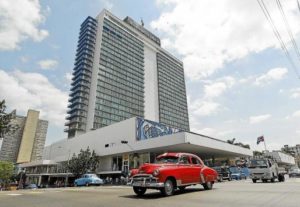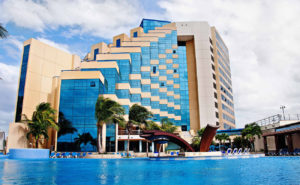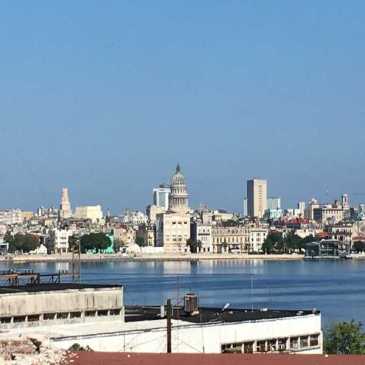 HOTELEROS ESPAÑOLES ACUERDAN CON CUBANOS DE MIAMI PARA EVITAR RECLAMACIONES.
HOTELEROS ESPAÑOLES ACUERDAN CON CUBANOS DE MIAMI PARA EVITAR RECLAMACIONES.
El pasado 2 de mayo la Administración americana que preside Donald Trump activó el Título III de la Ley Helms-Burton contra Cuba, y con él las demandas de los herederos de exiliados cubanos en Estados Unidos afectados en su día por las expropiaciones de solares e inmuebles que llevó a cabo la Revolución a principios de los años 60.
Los despachos de abogados de Miami y Washington ya han comenzado a tramitar demandas contra empresas multinacionales, principalmente hoteleras, que operan en terrenos y edificios nacionalizados por el régimen castrista en las principales zonas turísticas de Cuba y, en concreto, en La Habana.
La reacción de las empresas españolas no se ha hecho esperar, de ahí que cadenas hoteleras mallorquinas van a acelerar los contactos iniciados en los últimos años para llegar a acuerdos para evitar los problemas que se van a derivar a partir de ahora con la apertura de demandas.
«Ya se han cerrado acuerdos y plasmado las oportunas indemnizaciones que pedían los herederos de los terrenos expropiados en Cuba, pero también es cierto que ahora las pretensiones económicas que piden algunos de ellos han impedido cerrar más operaciones. Serán los tribunales internacionales los que tengan que decir al respecto», indican asesores de las cadenas hoteleras mallorquinas.
En estos momentos operan en los cayos y en las zonas turísticas de Cuba las cadenas Meliá, Iberostar, Barceló, Be Live (Globalia), Blau, Valentín y Roc.
El principal problema, a parte del económico, es el endurecimiento de Washington con Cuba, que en caso de ir más, puede provocar la amenaza de sanciones a las empresas españolas con intereses en Cuba. Ya sucedió un hecho similar hace años y Bruselas siempre se puso del lado de los intereses de España y de resto de países de la Unión Europea.
La ley Helms-Burton también afecta muy directamente a todos los proyectos residenciales con capital extranjero que se han estado plasmando desde 2015 con el Gobierno cubano en Varadero y resto de enclaves vacacionales.
La pugna política de Donald Trump contra La Habana ha hecho mover ficha al Gobierno que preside Pedro Sánchez.
La ministra de Industria, Turismo y Comercio, Reyes Maroto, viaja este fin de semana La Habana para participar en feria turística Fitcuba.
Maroto visitará hoteles que gestionan empresas mallorquinas, entre ellas Meliá, Iberostar y Roc, pero al mismo tiempo mantendrá reuniones con miembros del Gobierno cubano, entre ellos el ministro de Turismo, Manuel Marrero, y con el ministro de Comercio Exterior e Inversión Extranjera, Rodrigo Malmierca.
El martes, la ministra acudirá a la inauguración de la feria en el recinto ferial Morro-Cabañas, en el que habrá una amplia representación de empresarios mallorquines de todos los sectores turísticos.
 SPANISH HOTELIERS AGREE WITH CUBANS OF MIAMI TO AVOID CLAIMS.
SPANISH HOTELIERS AGREE WITH CUBANS OF MIAMI TO AVOID CLAIMS.
On May 2, the American Administration presided by Donald Trump activated Title III of the Helms-Burton Law against Cuba, and with it the demands of the heirs of Cuban exiles in the United States affected in their day by the expropriation of land and buildings. that carried out the Revolution in the early ’60s.
The Miami and Washington law firms have already begun filing lawsuits against multinational companies, mainly hotel companies, that operate on lands and buildings nationalized by the Castro regime in the main tourist areas of Cuba and, specifically, in Havana.
The reaction of Spanish companies has not been waiting, hence Mallorcan hotel chains will accelerate the contacts initiated in recent years to reach agreements to avoid the problems that will be derived from now with the opening of lawsuits.
“Agreements have already been closed and the appropriate compensation demanded by the heirs of the expropriated land in Cuba has been established, but it is also true that now the economic claims that some of them have requested have prevented further operations from being closed. It will be the international courts that have to say about it », indicate advisers from the Mallorcan hotel chains.
At present, the Meliá, Iberostar, Barceló, Be Live (Globalia), Blau, Valentín and Roc chains operate in the cays and tourist areas of Cuba.
The main problem, apart from the economic one, is the hardening of Washington with Cuba, which in case of going further, can provoke the threat of sanctions against Spanish companies with interests in Cuba. A similar event happened years ago and Brussels always sided with the interests of Spain and other countries of the European Union.
The Helms-Burton Act also directly affects all residential projects with foreign capital that have been taking shape since 2015 with the Cuban Government in Varadero and other holiday resorts.
The political struggle of Donald Trump against Havana has made move to the Government presided over by Pedro Sánchez.
The Minister of Industry, Tourism and Commerce, Reyes Maroto, travels this weekend Havana to participate in the Fitcuba tourism fair.
Maroto will visit hotels managed by Mallorcan companies, including Meliá, Iberostar, and Roc, but at the same time he will hold meetings with members of the Cuban government, including the Minister of Tourism, Manuel Marrero, and the Minister of Foreign Trade and Foreign Investment, Rodrigo Malmierca
On Tuesday, the minister will attend the opening of the fair at the Morro-Cabañas fairgrounds, where there will be a broad representation of Mallorcan businessmen from all tourist sectors.
Agencies/ UHNoticias, Spain/J. L. Ruiz Collado/ Internet Photos/ Arnoldo Varona/ www.TheCubanHistory.com
THE CUBAN HISTORY, HOLLYWOOD.



 < SPANISH Hoteliers Agree with Cubans of Miami to Avoid Claims.
< SPANISH Hoteliers Agree with Cubans of Miami to Avoid Claims.




